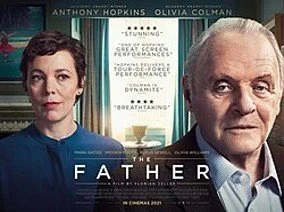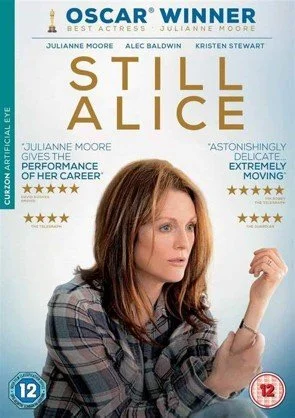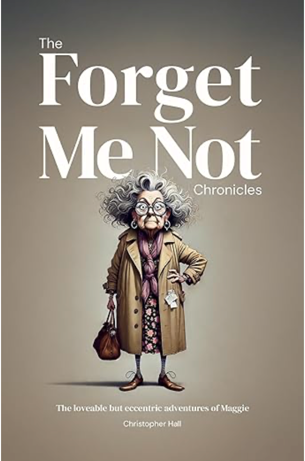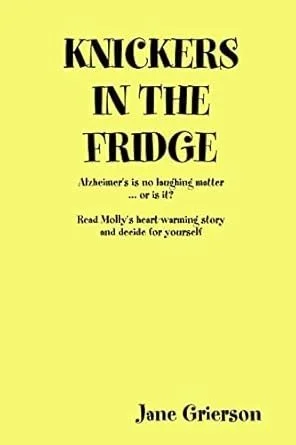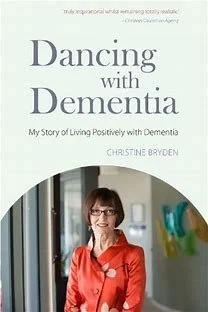Books, Films and dementia
Why We Recommend Watching Films or Reading Books with your Loved One
Short-term memory is most often affected by Alzheimer’s and other forms of Dementia, yet for people living with one or more forms, their memories from the past are usually well-preserved. Therefore, movies that they enjoyed when they were younger can be a source of comfort and enjoyment when everyday life is confusing and unnerving.
Movies can help stimulate memories which may lead to conversation, consequently helping to reduce feelings of isolation. Regardless of the type of film preferred, watching movies together with loved ones can help generate a feeling of closeness with them that family may be struggling to experience as the Person’s Dementia progresses
Films and Books we recommend
Film: The Father (2020)
Anthony refuses to accept any help from his daughter Anne, or any family members, Anthony's confusion increases, he's battling Dementia.
A powerhouse performance from Anthony Hopkins, this film is outstanding in almost every avenue. It came as no surprise that Hopkins was chosen for the part, he delivers a stellar performance, you'll feel Anthony's frustrations, hurt, and now and then you'll chuckle with him.
If you know someone with, or have cared for someone that suffers with Dementia, you will spot so many of the little signals and quirks here.
This film is so incredibly realised, when you see Dementia sufferers on the big screen, you normally get the view point of the friend or loved one affected by it, here you see the effect from the sufferer's point of view
Review: Hard to watch at times, but essential viewing. There's a degree of originality about this film that sets it apart, it is without a doubt, one of the best films from the last two decades.
Film & Book: Still Alice (2014) by Lisa Genova
Dr. Alice Howland, an intelligent lecturer at a university, confronts early-onset Alzheimer’s disease. The film, takes viewers on a gripping journey through Alice’s life, showcasing the devastating impact of the disease on her relationships, career, and identity.
The ending of “Still Alice” is both heart retching and thought-provoking. As the film progresses, we witness Alice’s gradual decline, her struggles with memory loss, and the strain it places on her family. In the final scenes, Alice, now in the advanced stages of the disease, finds solace in recording a video message for her future self. She imparts her wisdom, acknowledging the inevitability of her condition and encouraging her future self to embrace the moments of lucidity and joy that may still come her way.
Review: The book is phenomenal and the process of adapting Lisa Genova’s novel into a screenplay was a collaborative effort between the author and filmmakers, and WOW. Honest, and sensitive portrayal of Alzheimer's disease.Beautifully written and beautifully adapted into the film.
Film & Book: Grandpa’s Great Escape by David Walliams
The story follows a boy called Jack trying to rescue his confused Grandpa from a retirement home, Twilight Towers run by an evil matron, Miss Swine.
Grandpa's Great Escape is set in London in 1983 and tells the tale of Grandpa, a World War II flying ace, who sadly is now confused due to Alzheimer's disease, and is still believing that World War II hasn't ended and longing to re-live his past.
His family can no longer look after him, Grandpa is moved to Twilight Towers, a prison-esque old people's home run by Miss Swine.
It soon becomes clear Miss Swine is running Twilight Towers for her own personal gain, and it is up to Grandpa and his 12-year-old grandson Jack, the only one who can understand his beliefs, to make a daring escape. Grandpa takes a final chance to relive his past and once again flies in his beloved Spitfire.
Review: Many reviews appreciate the strong bond between Jack and his grandfather, a former WWII pilot. The story celebrates memories and the adventures between generations, emphasizing the importance of family and love. The book creatively portrays the challenges of navigating relationships with elderly relatives facing Dementia, often delivering poignant moments amidst humorous escapades.
Films for Children
Finding Dory (2016) – Pixar/Disney
•Character: Dory, a blue tang fish with short-term memory loss.
•Dementia Connection: While not explicitly about dementia, Dory’s memory issues closely mirror some cognitive symptoms, and the film deals with acceptance, patience, and perseverance.
•Age Group: 5+
Why it’s helpful: Encourages understanding and empathy toward people with memory challenges.
Up (2009) – Pixar/Disney
•Character: Carl, an elderly man dealing with grief and aging.
•Dementia Connection: While dementia isn’t named, the portrayal of aging, memory, and emotional loss (through Ellie’s absence and Carl’s behaviour) opens space for discussion.
•Age Group: 7+
•Why it’s helpful: Gently introduces topics of aging, emotional change, and connection.
Coco (2017) – Pixar/Disney
•Character: Mama Coco, an elderly woman with memory loss.
•Dementia Connection: Mama Coco exhibits signs of memory loss, especially forgetting key family members. The story emphasizes the importance of family stories and memory.
•Age Group: 6+
Why it’s helpful: Tenderly illustrates the power of music, memory, and intergenerational connection.
Book: What I wish People Knew about Dementia by Wendy Mitchell
In "What I Wish People Knew About Dementia," Wendy Mitchell, diagnosed with early-onset Dementia at age 58, combines her personal journey with thorough research and practical advice.
The book aims to change perceptions and provide tools for both individuals with Dementia and their caregivers.
covers multiple aspects of living with Dementia, from sensory changes and emotional impacts to the importance of peer support.
Available on audio book too- read by Wendy herself. Feels like a conversation, but it's insightful, interesting, emotional, and lots of research backed information.
By reading this book, you're not just learning about Dementia; you're also discovering ways to connect with and support those who experience it, illuminating the often-overlooked personal experiences behind the diagnosis.
You can still live a long and healthy and happy life with a Dementia diagnosis, as long as you get the right support.
Book: Dementia in Close-Up by by Bere M.L.Miesen
Dementia in Close-Up is a clear and practical guide to Dementia and the world of the Dementia sufferer. Bere Miesen assumes no medical or specialist knowledge and uses first hand accounts and real-life examples to examiners on patterns of behaviour and responses of sufferers and their carers.
Going beyond purely medical descriptions of Dementia, this book combines compassionate insight into a difficult and isolating condition with practical advice for those caring for or planning services for people with Dementia, whether professional heath care workers, home carers or family members.
Books: The Forget Me Not Chronicles by Christopher Hall
Maggie Harris has declared herself an Icelandic princess, insists she once dated a Viking from Scarborough, and is currently holding a garden gnome hostage. She’s also losing her memory.
Tom, her long-suffering son, would love nothing more than a quiet life. Instead, he’s juggling care plans, biscuit shortages, and trying to stop his mother from getting arrested - again.
The Told through Tom’s world-weary but affectionate eyes, this book captures the beautiful absurdity of caring for someone who’s slowly forgetting who you are - but never losing who they are at heart.
Each chapter is its own comedic adventure: a failed funeral for someone still alive, a toaster deemed “a domestic terrorist,” and a deeply suspicious number of shopping baskets mysteriously appearing in Maggie’s hallway. But beneath the laughter lies something deeper - an unspoken grief, the ache of watching someone fade, and the quiet heroism of showing up anyway. This one will make you laugh and cry. It has a 4.66/5 rating on Goodreads.
Book: Knickers in the Fridge by Jane Grierson
Knickers in the fridge was written by Jane Grierson, who's mother Molly had dementia.
Dementia isn't all doom and gloom. There is a lighter side to alzheimers and this book has it all!
Easy read.
Relateable.
Will make you chuckle and weep.
Weird to think a book about dementia could make you laugh but it really does.
The end sentence of the book:
"There is more money being spent on breast implants and Viagra today than on Alzheimer's research. This means that, by 2024, there should be a large, elderly population with perky boobs and huge erections and absolutely no recollection of what to do with them"
Dancing with Dementia: My Story of living positively with Dementia by Christine Bryden
Story of a lady who worked as a top civil servant, and a single mother of three children who was diagnosed with early onset Dementia at the age of 46.
Since her diagnosis she has been on a mission to challenge people's perspectives of Dementia and writes articles and speaks at conferences to help spread awareness.
Christine is a woman of faith and speaks often about her struggles with faith and her diagnosis, and how she relies on her faith for comfort and strength.
Learning to speak Alzheimers, by Joanne Koenig Coste
Joanne Koenig Coste has a practical approach to the emotional well-being of the person with Dementia and their caregiver.
In this book, the author emphasises on 'relating to the person with Dementia' , ' getting into their reality'.
Lots of hints and tips in this book.
How to cope with diagnosis, to facing issues like: driving, making meals, bath times, and wandering/paranoia episodes.
Reviews from Amazon:
"A really nice reference for all stages of Alzheimers. I appreciate the “to the point” talk and suggestions and feel much better approaching challenges of being a caregiver.”
“Written by someone who knows from experience what a caregiver's life entails. She gives so many practical hints for making life better for the caregiver and the one with Dementia.”
“This is an excellent book to help understand how to care for someone with Dementia. I highly recommend it. It is eye-opening and invaluable for helping and interacting with someone who has Dementia. And it will allow the caregivers/family members to have a far more enriched relationship with the Dementia sufferer. I strongly believe that this helps me and my sisters improve the quality of our father's life.”
Book: Three Voices by Lesley Hawkins
This book tells the story from the perspective three generations of one family dealing with the grandmother’s Dementia.
Books for Children
The Remember Balloons by Jessie Oliveros (Author), Dana Wulfekotte (Illustrator)
Focus: Explains memory loss using the analogy of balloons floating away
•Why it’s helpful: tender, sensitive picture book that gently explains the memory loss associated with aging and diseases such as Alzheimer’s.
Wilfrid Gordon McDonald Partridge by Mem Fox
•Focus: A boy helps an elderly friend in a nursing home remember special things.
•Why it’s helpful: Touching, poetic, and introduces the idea of memory in a beautiful way.
Grandma by Jessica Shepherd
•Focus: Told from the perspective of a child whose grandma has Dementia.
•Why it’s helpful: Factual and emotional, includes helpful end notes for adult
Still My Grandma by Veronique Van den Abeele
Focus: A young child notices the changes in her grandmother as she struggles with Alzheimer's, but the story focuses on their continued love and connection.
Why it’s helpful: Encourages empathy and offers insight into the nature of progressive diseases.
For the 7- 11 age range there are some story books:
The Memory Box
•Focus: When Gramps realizes he has Alzheimer's disease, he starts a memory box with his grandson, Zach, to keep memories of all the times they have shared.
•Why it’s helpful: Something that could be recreated by a junior school child and grandparent.
Remembering for Both of Us: A Child Learns About Alzheimer's by Charlotte Wood
•Focus: A girl notices her grandma forgetting more, and they find ways to stay close.
•Why it’s helpful: Educational yet sensitive, includes tips for caregivers too.
But, not more factual books which are written in an age-appropriate language and which include ideas about how to interact with someone with Dementia.
The ‘ADS’ A Kid’s Guide to Dementia was written by Tegan Harris to fill this gap.
Written for her A level EPQ, she attended Dementia training with ’ADS’ and interviewed staff and those living with Dementia, extending her knowledge beyond academic research;
Once graded for her A level, she donated the book to ‘ADS’ and so all proceeds go to directly supporting those affected by Dementia
Available in both printed and on-line copies from our website.

